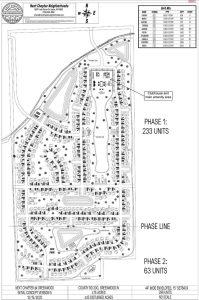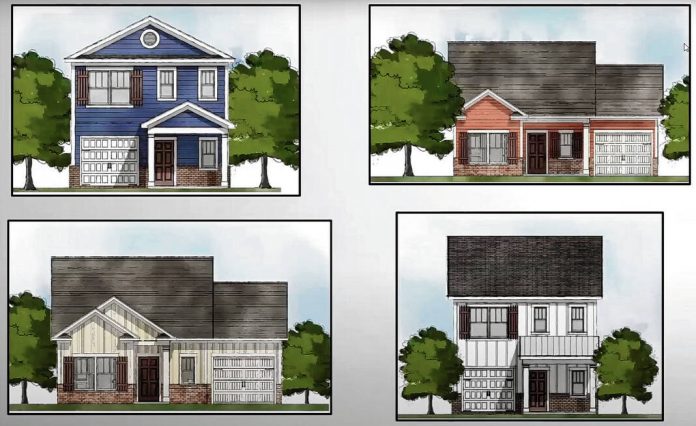The Greenwood City Council almost unanimously rejected an annexation that would have brought a rental home subdivision to the city’s east side.
The annexation of 80.9 acres of land at the southwest corner of East County Line Road and North Five Points Road failed to pass in a 1-8 vote Monday night, with council member Dave Lekse being the lone vote in favor. Georgia-based developer Next Chapter Neighborhoods had asked for a majority of the land to be zoned as residential attached for single-family homes and for the northeast section of about 10 acres to be zoned as commercial small for future commercial developments.
The annexation vote came after the city council also failed to pass the fiscal plan for the annexation, which is required by state law to pass before an annexation could take place. The fiscal plan failed to pass 3-6, with council members Lekse, Mike Campbell and Steve Moan being the yes votes.
Both the fiscal plan and the annexation were amended to incorporate the Advisory Plan Commission’s 5-3 favorable recommendation. The project has divided officials since it first came before the plan commission.
The project
Next Chapter Neighborhoods specializes in building for-rent, single-family neighborhoods. The company has built several developments with this concept, including Dupont Meadows in Fort Wayne.
The company planned to build a neighborhood of cottage homes with one to four bedrooms in Greenwood. Up to 296 homes were planned to be built in two phases, with phase one consisting of 233 units, according to a presentation by Andrew Malzter, the company’s vice president of development.
Homes would have had an average square footage of 1,300 feet and an average rent of $1,900, according to Malzter’s presentation.
Next Chapter Neighborhoods planned a capital investment of $65 million for the project, which would have added more than $700,000 of additional tax revenue each year to the city, Malzter said.
Only one member of the public spoke about the project Monday. Indianapolis resident Sam Hartley, who previously testified before the plan commission, expressed concerns about adding more rentals in the area. There are an estimated 750 apartments under development on both sides of the county line, he said.
Hartley also analyzed the proposed rent for the project, comparing it to the developer’s Fort Wayne project. The base rent in Fort Wayne is $1,500 a month, being raised by 4% a year, he said.
The 4% yearly increase is common, and is based on the national rate, Maltzer said. Planning Director Gabe Nelson took issue with this, saying the the developer could follow the market rate at 2 or 4%, but could also follow it if it goes up to 9 or 10%.
Market concerns

Other concerns were mentioned, but concerns over the impact the development could have on the housing market and corporate ownership of the complex weighed heavily in the council’s ultimate vote against the project.
City planning staff and several city council members expressed concerns and at times the discussions between officials and the developer became testy.
Planning staff were unfavorable toward the project. While they acknowledged that the location and the commercial aspect were not problematic, they had concerns about the concentration of rental homes on a single lot. It would be a 65-acre lot for a large number of rental homes, which means they can’t be converted to owner-occupied single-family homes, Nelson said.
“This does nothing to add homes to the market,” he said. “These are rental products that are sprawled over 65 acres.”
Nelson also reiterated concerns that the high concentration of rental homes could create a monopoly. Planning staff was also concerned about the corporate ownership of the homes and the zoning, he said.
City council member Linda Gibson acknowledged the city has a housing shortage, but said this development is not the answer. She highlighted several aspects of the project and a recent Indianapolis Metropolitan Planning Organization housing study which, among other factors, said the region’s lack of housing options could compromise workforce development.
An analysis of the study also addressed corporate-owned single-family homes for rent, and how they could create a monopoly that manipulates the rental market. Gibson sees Greenwood as a community where a majority preferred ownership compared to renting.
In her opinion, the Next Chapter Neighborhood was not a “good fit” for Greenwood, she said.
Testy back-and-forth
Maltzer disagreed, however, saying the reasons Gibson cited were reasons they built these neighborhoods. The development is also not preventing anyone from buying a house, but rather giving more options to those that don’t want to right now, he said.
Maltzer also emphasized several times that while Next Chapter Neighborhoods rents single-family homes, they are not the same as corporate hedge funds that purchase and rent out formerly owner-occupied single-family homes.
“We build new products. We’re not affecting the existing [homes],” Maltzer said.
Nelson acknowledged Next Chapter is different, though they are still a corporation renting homes to residents. Statistics show that eventually nearly 40% of all single-family homes will be owned by institutional investors.
“How much do you guys want to accelerate that trend in Greenwood?” Nelson asked rhetorically.
The Next Chapter is new in Central Indiana, and there’s no way to say if they would’ve been managing the property forever, he said.
“They can easily turn around and sell it to a group that does not care about a great community and is not the best at maintenance,” Nelson said.
Following questioning from council member Steve Moan, Maltzer later admitted that the developer had sold their two of their four developments, leading to groans of displeasure from several council members.
He also said that “yes” Next Chapter has investors.
“We have investors, and I hate to break it to you, Gabe, almost every housing development [has] people looking to make a profit,” Maltzer said. “This was not government subsidized, so you don’t have to worry about that. So yes, I have no shame in saying we’re in it to make a profit. Absolutely.”
A home-buyer on the city’s east side, council member Michael Williams has had his own struggles trying to find a home within his family’s price range. The city needs single-family homes, not rentals, he said.
“This is fresh land. It’s on the edge of town,” Williams said. “We don’t have to determine the future right now with a project that’s not the right fit.”
Council member Dave Lekse, who was the only yes vote for the annexation, liked the proposal and previously voted in favor of the plan commission’s favorable recommendation. It’s an alternative housing option that offers a needed supply, he said.
Editor’s note: A correction to a passage talking about the rent amount of the Fort Wayne property was added.





